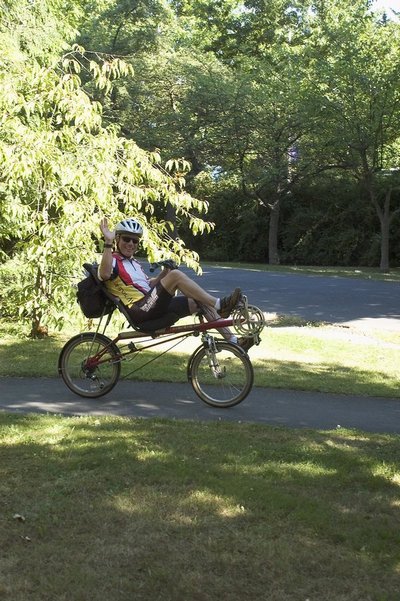July 19, 2007
Auf Wiedersehen, John Coulter!
On July 27, John Coulter, associate vice president for medical affairs and executive director for Health Sciences Administration, will get on his bike and ride off into the sunset as he retires from the UW after almost 29 years of service. It was only fitting to note this milestone by having a last conversation with John, if for no other reason than to find out what a high-energy individual like John is going to do with himself 24 hours a day, seven days a week without work to keep him occupied.
As I found out, John has plans…
Q: John, you’re leaving…
A: I was fired?
Q: No, you didn’t let me finish. You are retiring and I want to know where you going, what are you going to do?
A: I am simply moving on to next part of my life. I have things to do. I am getting on my boat and going for seven weeks, and then I am coming back. All I know is that I have a wedding to attend in Whistler in September.
Q: I think of you as Mr. Energy — you ride your bike to work, you are always going some place, you can barely sit still. I can’t imagine you on a boat for seven weeks. What will you do?
A: Something always needs fixing on a boat — I’ll fix things. I like to read, and I do a lot of that on the boat. You keep busy on a boat.
I have three daughters and five grandkids that live around the state and in Arizona. All are good skiers, bike riders and I’m going to spend some time with them and my wife. I’ve been doing ‘this’ (work) for 40 years.
Q: Forty years? You’ve been at the UW for 40 years?
A: No, I have been working in similar positions for that long — I started my career in Buffalo as the assistant to the chair in Physics — it was the first such position ever created at SUNY [State University of New York]. Then I went on to Pharmacy as an assistant dean, finished up my MBA with a major in health care and then took a position as an associate dean for the school of medicine at SUNY at Stony Brook. I came to the UW in 1979.
Q: Wow. What has kept you here that long?
A: Every day is a new day; there is always something different happening. I’ve worked with a lot of deans and covered a wide variety of issues. Health Sciences is a busy place — there are six schools, two hospitals, four interdisciplinary institutes, divisions of academic services, animal care, risk management, government relations, health and safety and student health services. I could never get bored. The problems are always interesting, the problems are always different.
Q: Throughout your career, who would you say was your mentor?
A. Here at the UW there were several people.Vice presidents Tom Grayston, who hired me, Jack Lien, Phil Fialkow and Paul Ramsey. All of them let me do more than I should have been allowed to do and they always supported me.
In my Health Sciences position I worked for the UW president — Bill Gerberding, Lee Huntsman and Mark Emmert were each mentors and supporters. And there were the chairs of the Board of Health Sciences Deans — Milo Gibaldi, Paul Roberston, Sid Nelson. They have all been great.
I think of each of these individuals as a mentor and friend.
Q: Are there any memories that particularly stick out? When you think of the UW, what will you remember?
A: Well, there are a lot of things. Like the time one of the baboons in the Primate Center grabbed a fire hose, turned it on and caused a full response from the fire department (raucous laughter). Oh jeez. The thing I think of the most is the collegiality of the HS deans — they work so well together. I have worked at two other health sciences centers and none have been as collegial. I will remember the people who conduct the business of the university. The people who who keep the hallways clean, people who at every level, are truly dedicated to this place. Look at the grounds here. It sure isn’t the size of the budget that makes this place so special; it is the commitment of people that makes this place work well.
Q: What would you like people to remember about John Coulter?
A: I would hope they would say that I was fair and that I cared.
Q: Any parting words?
A: I remember that the chair of medicine at Stony Brook asked me if I was really going to go to Seattle. He told me that when he disembarked from his troop ship after WWII in Seattle, he remembered the beauty of the city, the friendliness of the people and that the UW had two of everything. He told me that if I went to Seattle, it would stunt my career. He said I would never leave. Well, he had it dead on.
I think every day how lucky it was that I fell into this place —- all the way from the other side of the country. The UW is a beautiful place, and I wonder how I got so lucky to work here with all these incredible people. Those are my parting words.

